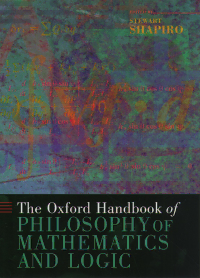Table Of ContentCover Page: i
Title Page Page: iii
Copyright Page Page: iv
Contents Page: vii
Notes on the Contributors Page: xi
1. Philosophy of Mathematics and Its Logic: Introduction Page: 3
2. Apriority and Application: Philosophy of Mathematics in the Modern Period Page: 29
3. Later Empiricism and Logical Positivism Page: 51
4. Wittgenstein on Philosophy of Logic and Mathematics Page: 75
5. The Logicism of Frege, Dedekind, and Russell Page: 129
6. Logicism in the Twenty-first Century Page: 166
7. Logicism Reconsidered Page: 203
8. Formalism Page: 236
9. Intuitionism and Philosophy Page: 318
10. Intuitionism in Mathematics Page: 356
11. Intuitionism Reconsidered Page: 387
12. Quine and the Web of Belief Page: 412
13. Three Forms of Naturalism Page: 437
14. Naturalism Reconsidered Page: 460
15. Nominalism Page: 483
16. Nominalism Reconsidered Page: 515
17. Structuralism Page: 536
18. Structuralism Reconsidered Page: 563
19. Predicativity Page: 590
20. Mathematics—Application and Applicability Page: 625
21. Logical Consequence, Proof Theory, and Model Theory Page: 651
22. Logical Consequence From a Constructivist Point of View Page: 671
23. Relevance in Reasoning Page: 696
24. No Requirement of Relevance Page: 727
25. Higher-order Logic Page: 751
26. Higher-order Logic Reconsidered Page: 781
Index Page: 811
Description:Mathematics and logic have been central topics of concern since the dawn of philosophy. Since logic is the study of correct reasoning, it is a fundamental branch of epistemology and a priority in any philosophical system. Philosophers have focused on mathematics as a case study for general philosophical issues and for its role in overall knowledge- gathering. Today, philosophy of mathematics and logic remain central disciplines in contemporary philosophy, as evidenced by the regular appearance of articles on these topics in the best mainstream philosophical journals; in fact, the last decade has seen an explosion of scholarly work in these areas.
This volume covers these disciplines in a comprehensive and accessible manner, giving the reader an overview of the major problems, positions, and battle lines. The 26 contributed chapters are by established experts in the field, and their articles contain both exposition and criticism as well as substantial development of their own positions. The essays, which are substantially self-contained, serve both to introduce the reader to the subject and to engage in it at its frontiers. Certain major positions are represented by two chapters--one supportive and one critical.
The Oxford Handbook of Philosophy of Math and Logic is a ground-breaking reference like no other in its field. It is a central resource to those wishing to learn about the philosophy of mathematics and the philosophy of logic, or some aspect thereof, and to those who actively engage in the discipline, from advanced undergraduates to professional philosophers, mathematicians, and historians.

